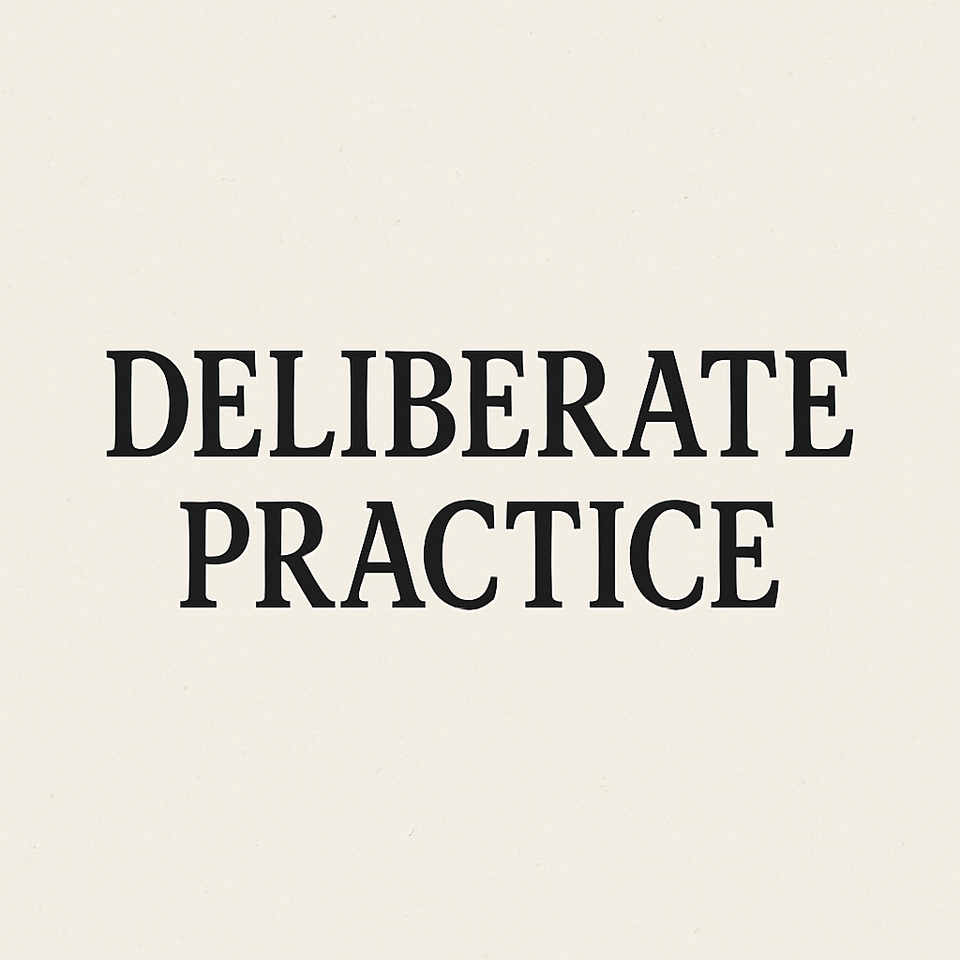Breaking Out of a Plateau with Deliberate Practice

One potential solution for getting out of a plateau is deliberate practice. Research suggests that the world's best performers use deliberate practice to get to the top.
Deliberate practice is hard to define in one sentence. It is best understood by understanding its components.
- Deliberate practice is designed and supervised by a teacher or coach who understands both the abilities of expert performers and the most effective ways to develop them. This doesn't mean that your teacher needs to be with you every second. The teacher can provide you drills and practices to be done alone. However, as we'll discuss next, frequent check-ins are important. Many of the best performers in the world began by meeting with a teacher about once a week.
- Deliberate practice involves feedback and changes in behavior in response to that feedback. Initially, feedback comes from your teacher. As time passes and your skill level increases, you need to learn to give yourself feedback. This is because most experts spend a large amount of time practicing alone.
- When you're practicing, you might be doing some degree of self-monitoring so you can give yourself feedback (e.g., that didn't feel quite right, I think I need to do this instead). However, be careful about self-monitoring while engaged in the skill or behavior as this can take you out of the present moment and break concentration. Some tips to keep in mind. 1. Skills that you've already mastered likely don't need much monitoring, but newer skills will require more. 2. Give yourself feedback after you have finished the behavior. 3. Consider videorecording and doing self-feedback after the session. 4. Have an occasional high feedback session where you focus on feedback while engaging in the behavior. Then have other sessions where you don't do any feedback at all until after the behavior is over.
- Deliberate practice requires you to be outside of your comfort zone. You don't want to be too far outside of your comfort zone such that you completely fail, but you need to be attempting things that are just beyond your current abilities.
- Deliberate practice includes a specific, well-defined goal (e.g., I want to increase my vertical jump by three inches). However, it doesn't stop there. Deliberate practice has micro-goals (e.g., I need to increase my calf strength so that I'll be able to increase my vertical jump by three inches). Each time you practice and each action you take during practice should be targeting either the overall goal or a micro-goal that will lead to the overall goal. You should believe that what you're doing will help the micro-goal and subsequently the overall goal. Belief and mindset are important.
- Deliberate practice is focused. It requires your full attention and concentration. During deliberate practice you're thinking about how what you're doing will lead to improvement in the micro-goal.
- Keep learning new things about your skill so that you can create better mental representations (read books about it, talk about it with others, doodle about it, write about it, think about it while walking, etc.). A mental representation is a detailed mental structure that helps you understand and respond to information in your field. It's basically the way you see the world. When you get really good at something—like playing piano, solving math problems, or shooting a basketball—your brain starts to build mental pictures or maps of how to do it. These are called mental representations. They're like secret cheat codes in your brain that help you:
- Know what to do next without having to think too hard
- Notice mistakes quickly so you can fix them
- Get better faster because you understand what good performance looks like
You want to keep learning so that you can see your skill and how to improve it in a truer and truer light.
I recommend you evaluate your current practice approach against the deliberate practice approach to see if there are areas in which you can improve. The ideas you generate might be just the thing for getting you out of your plateau. For more detailed information on deliberate practice, I recommend reading Peak by Anders Ericcson and Robert Pool.

Member discussion